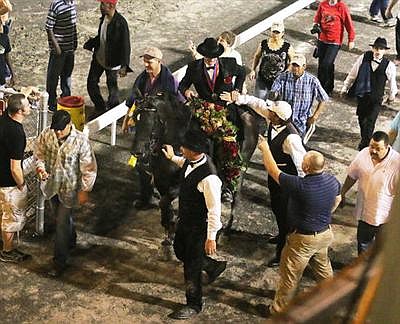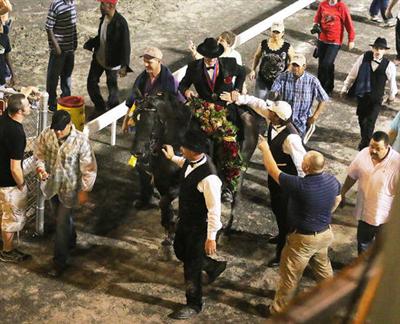Read more
Don't let Tennessee's Walking Horse be a dying breedStar horse trainer of 'Walking Dead' fame brings his philosophy to North Georgia ranch (with video)
For years, the Humane Society of the United States and sound horse advocates have prodded the U.S. Department of Agriculture and the U.S. Justice Department to toughen regulation of the Tennessee Walking Horse industry.
With the help of undercover video and through the blatantly stupid and cruel actions of some the industry's top trainers, owners and riders, those advocates and the Humane Society did make some headway: They got a lot of media attention and made a dent in the walking horse show attendance following the 2012 indictment and guilty plea of former Tennessee Walking Horse Hall of Fame trainer Jackie McConnell.
McConnell was caught on video beating a horse and instructing the soring other animals. Soring is the use of caustic chemicals, chains or painful shoeing used in conjunction with abnormally tall hoof pads. The result is injurious pain that makes the horses stretch to keep their legs in the air as long as possible because it hurts when their hooves hit the ground. Michael Blackwell, former dean of veterinary medicine at the University of Tennessee, has likened the "excruciating" pain to biting into something with an abscessed tooth.
With the advent in recent decades of tall pads, chains and oversized hooves that help hide the abuse, soring has turned the final days of the nearly two-week annual Tennessee Walking Horse National Celebration in Shelbyville, Tenn., into a sadistic parade of horses with a "big lick" gait that has become something akin to an exaggerated, tortured lunge. The horses no long resemble the incredibly fast, graceful and smooth walking horses that made these animals the iconic symbol of Tennessee.
The public's outrage at the video and ensuing stories, along with a spate of almost a dozen indictments against McConnell, lesser trainers and grooms, also prompted the original author of the more than 40-year-old Horse Protection Act to seek a new new tougher law. Despite enormous support from more than 300 co-sponsors, the new bill, called the the Prevent All Soring Tactics Act, or PAST Act, remained bottled up last year in committees by Tennessee and Kentucky lawmakers -- including Mitch McConnell, Lamar Alexander and Marsha Blackburn. Alexander and Blackburn penned their own new horse protection bill that in essence offers no new protection. Sound horse advocates hope the PAST Act will be reintroduced later this year.
Meanwhile, the Humane Society isn't giving up. The group wants walking horse owners to be held accountable, too, and now is imploring the both USDA and the Justice Department to file additional civil and perhaps criminal complaints against at least one owner who was involved in Jackie McConnell's fall from grace.
Wilsene Moody, who lives in Batesville, Ark., and Middle Tennessee, has been cited for violations of the Horse Protection Act several times, including one citation from the USDA in July 2012 alleging that one of her horses, Moody Star, was entered in the 69th Annual Tennessee Walking Horse National Celebration in violation of the Horse Protection Act. Moody Star also later was one of the horses that appeared in the Humane Society's undercover investigation of Jackie McConnell's barn in 2011. The horse, and the abuse to it, was described in McConnell's indictment.
In February 2014, USDA ordered Moody "disqualified for a period of 14 months from showing, exhibiting, or entering any horse, directly or indirectly through any agent, employee, or other device, and from judging, managing or otherwise participating in any horse show, horse exhibition, or horse sale or auction."
But her sored horse -- which has won many blue ribbons and a reserve world championship -- continues to be a contender in shows and continues to bring recognition and rewards to Moody and her husband. How? Circumvention of the penalties.
The Humane Society has documented that Moody transferred ownership of seven of her horses -- including Moody Star -- into her husband's name, Dr. Jack Kwok, executive director and treasurer of the State Convention of Baptists in Ohio. He, too, is a walking horse showman. Horse show records establish that all seven horses were entered into horse shows throughout Moody's disqualification period, according to the Humane Society's March 27 letter to Bernadette Juarez, director of investigative and enforcement services for the animal and plant health and inspection arm of USDA.
The letter, signed by Keith Dane, the Humane Society's vice president of equine protection, urges USDA "to pursue enforcement action against Moody, including referring the matter to the U.S. Department of Justice for civil action."
Neither Moody nor Kwok returned our calls seeking comment by press time.
Tennessee Walking Horse industry officials have consistently said there are just a "few bad apples" who make the whole industry look bad. The reality is that there are many bad apples angling for the rewards of this industry -- especially if the prosecution circle is widened to include not just trainers and grooms, but also owners who usually claim not to know of the abuse. Moody and Kwok's effort to circumvent the rules is but one "of the many tricks in the industry," according to Dane.
As for USDA and its enforcement -- even of the simple tracking of disqualifications and ownership transfers -- Dane says USDA simply does not have the resources to follow every angle.
"I just think that USDA is busy building the cases they have and pursuing new cases -- and they've been doing more of that, which we're glad to see. But I don't know that they're in the habit of going back to see if people are complying with their disqualification limits are not. We're hoping they will begin to [follow up]."
The PAST Act, because it would eliminate lay inspectors and the pads and chains that help hide soring, would go a long way toward helping this industry return to its roots of showing this beautiful, patient and iconic breed the old-fashioned way: Flatshod and sound.

